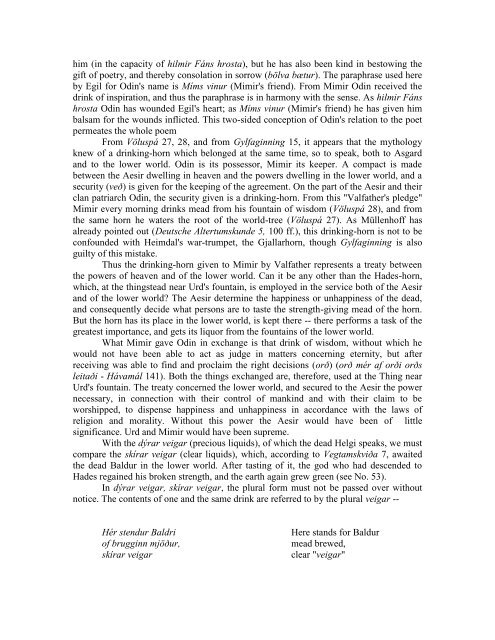Chapters 44-95 - Germanic Mythology
Chapters 44-95 - Germanic Mythology
Chapters 44-95 - Germanic Mythology
Create successful ePaper yourself
Turn your PDF publications into a flip-book with our unique Google optimized e-Paper software.
him (in the capacity of hilmir Fáns hrosta), but he has also been kind in bestowing the<br />
gift of poetry, and thereby consolation in sorrow (bölva bætur). The paraphrase used here<br />
by Egil for Odin's name is Míms vinur (Mimir's friend). From Mimir Odin received the<br />
drink of inspiration, and thus the paraphrase is in harmony with the sense. As hilmir Fáns<br />
hrosta Odin has wounded Egil's heart; as Míms vinur (Mimir's friend) he has given him<br />
balsam for the wounds inflicted. This two-sided conception of Odin's relation to the poet<br />
permeates the whole poem<br />
From Völuspá 27, 28, and from Gylfaginning 15, it appears that the mythology<br />
knew of a drinking-horn which belonged at the same time, so to speak, both to Asgard<br />
and to the lower world. Odin is its possessor, Mimir its keeper. A compact is made<br />
between the Aesir dwelling in heaven and the powers dwelling in the lower world, and a<br />
security (veð) is given for the keeping of the agreement. On the part of the Aesir and their<br />
clan patriarch Odin, the security given is a drinking-horn. From this "Valfather's pledge"<br />
Mimir every morning drinks mead from his fountain of wisdom (Völuspá 28), and from<br />
the same horn he waters the root of the world-tree (Völuspá 27). As Müllenhoff has<br />
already pointed out (Deutsche Altertumskunde 5, 100 ff.), this drinking-horn is not to be<br />
confounded with Heimdal's war-trumpet, the Gjallarhorn, though Gylfaginning is also<br />
guilty of this mistake.<br />
Thus the drinking-horn given to Mimir by Valfather represents a treaty between<br />
the powers of heaven and of the lower world. Can it be any other than the Hades-horn,<br />
which, at the thingstead near Urd's fountain, is employed in the service both of the Aesir<br />
and of the lower world? The Aesir determine the happiness or unhappiness of the dead,<br />
and consequently decide what persons are to taste the strength-giving mead of the horn.<br />
But the horn has its place in the lower world, is kept there -- there performs a task of the<br />
greatest importance, and gets its liquor from the fountains of the lower world.<br />
What Mimir gave Odin in exchange is that drink of wisdom, without which he<br />
would not have been able to act as judge in matters concerning eternity, but after<br />
receiving was able to find and proclaim the right decisions (orð) (orð mér af orði orðs<br />
leitaði - Hávamál 141). Both the things exchanged are, therefore, used at the Thing near<br />
Urd's fountain. The treaty concerned the lower world, and secured to the Aesir the power<br />
necessary, in connection with their control of mankind and with their claim to be<br />
worshipped, to dispense happiness and unhappiness in accordance with the laws of<br />
religion and morality. Without this power the Aesir would have been of little<br />
significance. Urd and Mimir would have been supreme.<br />
With the dýrar veigar (precious liquids), of which the dead Helgi speaks, we must<br />
compare the skírar veigar (clear liquids), which, according to Vegtamskviða 7, awaited<br />
the dead Baldur in the lower world. After tasting of it, the god who had descended to<br />
Hades regained his broken strength, and the earth again grew green (see No. 53).<br />
In dýrar veigar, skírar veigar, the plural form must not be passed over without<br />
notice. The contents of one and the same drink are referred to by the plural veigar --<br />
Hér stendur Baldri<br />
of brugginn mjöður,<br />
skírar veigar<br />
Here stands for Baldur<br />
mead brewed,<br />
clear "veigar"
















